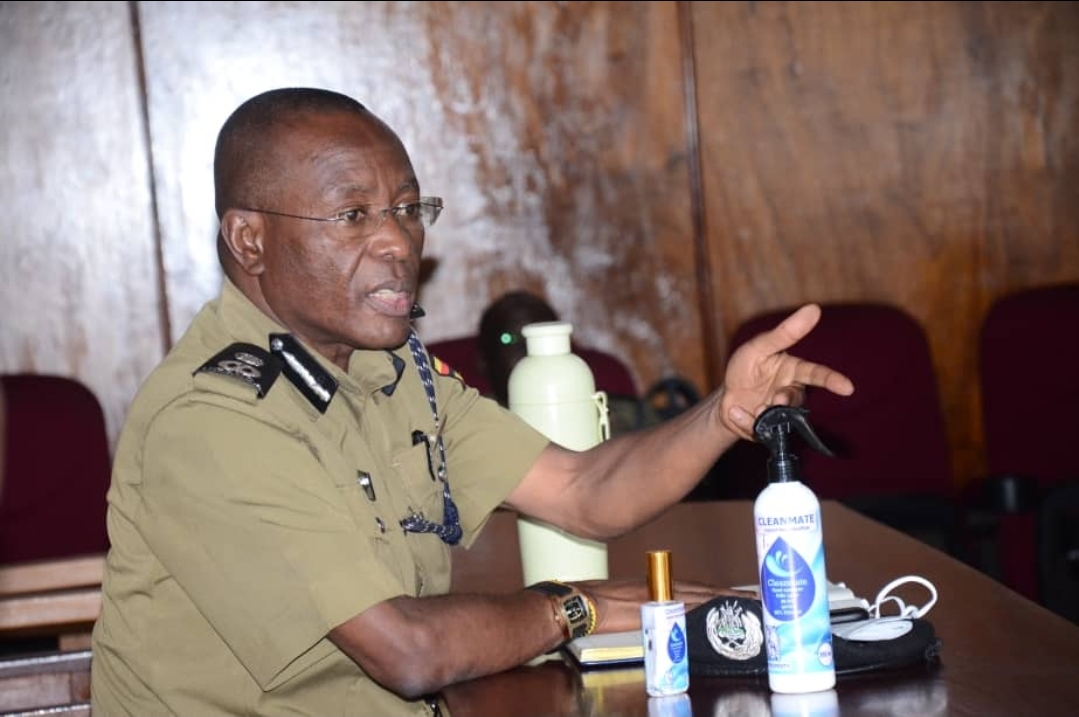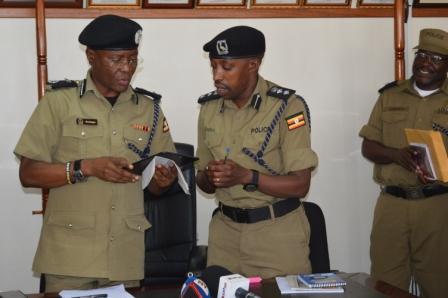Gender Based Violence is perceived as a global burden, the most widespread & socially
tolerated of human rights violations, cutting across borders, race, class, ethnicity and
religion. Gender Based Violence is seen as a human rights issue with numerous international and regional instruments spelling out commitments and obligations to GBV prevention. In Uganda, GBV is perceived as a critical national problem with severe, longterm negative impacts on the physical, sexual, and mental wellbeing of the survivors, family, and community.
religion. Gender Based Violence is seen as a human rights issue with numerous international and regional instruments spelling out commitments and obligations to GBV prevention. In Uganda, GBV is perceived as a critical national problem with severe, longterm negative impacts on the physical, sexual, and mental wellbeing of the survivors, family, and community.
The Government of Uganda is committed to addressing Gender Based Violence (GBV)
which is a serious human rights, public health and a socio-economic concern. This commitment is reflected in the existence of a policy on the Elimination of Gender Based
Violence in Uganda 2016 and the Domestic Violence Act 2010 and its regulations 2011
which focus on the protection of rights holders and offering strategic guidance to duty bearers. The National Policy on Elimination of GBV calls for specific promotion of male involvement as a strategy to enhance community participation in prevention and response to GBV.
which is a serious human rights, public health and a socio-economic concern. This commitment is reflected in the existence of a policy on the Elimination of Gender Based
Violence in Uganda 2016 and the Domestic Violence Act 2010 and its regulations 2011
which focus on the protection of rights holders and offering strategic guidance to duty bearers. The National Policy on Elimination of GBV calls for specific promotion of male involvement as a strategy to enhance community participation in prevention and response to GBV.
The Government of Uganda has registered considerable effort in policy and programme
development and implementation with regard to prevention and response to Gender Based Violence (GBV). This progress is reflected in the national policies and laws which underscore Gender Based Violence as a national concern that impedes development.
development and implementation with regard to prevention and response to Gender Based Violence (GBV). This progress is reflected in the national policies and laws which underscore Gender Based Violence as a national concern that impedes development.
These include the Penal Code Act (2007), Children’s Act Amendment (2016), The
Domestic Violence Act, 2010 and its Regulations 2011, The Prohibition of Female Genital Mutilation Act, 2009 and its regulations 2013, Trafficking in Persons Act, (2009) The Employment Act 2006 and policies such as the Uganda Gender Policy (2007). Despite these efforts, Gender Based Violence remains persistent. This however calls for a multi-sectoral approach to effectively prevent and respond to GBV/VAC in our communities.
According to the Uganda Demographic Health Survey (UDHS) 2011 and 2016, GBV is perceived as one of the complex social phenomenon especially given the social structures and processes that reinforce its occurrence. In its complexity, GBV not only occurs amongst intimate relationships, but it can occur in families, communities and workplaces. It further indicates that GBV is still socially acceptable amongst women and men. The UDHS 2011 specifically survey indicates that 58% women and 43.7% men aged 15-49, accept that a husband is justified to hit or beat his wife for any one of the reasons such as burning food, arguing with him, going out of home without telling him, neglecting children or refusing him sexual intercourse.
Domestic Violence Act, 2010 and its Regulations 2011, The Prohibition of Female Genital Mutilation Act, 2009 and its regulations 2013, Trafficking in Persons Act, (2009) The Employment Act 2006 and policies such as the Uganda Gender Policy (2007). Despite these efforts, Gender Based Violence remains persistent. This however calls for a multi-sectoral approach to effectively prevent and respond to GBV/VAC in our communities.
According to the Uganda Demographic Health Survey (UDHS) 2011 and 2016, GBV is perceived as one of the complex social phenomenon especially given the social structures and processes that reinforce its occurrence. In its complexity, GBV not only occurs amongst intimate relationships, but it can occur in families, communities and workplaces. It further indicates that GBV is still socially acceptable amongst women and men. The UDHS 2011 specifically survey indicates that 58% women and 43.7% men aged 15-49, accept that a husband is justified to hit or beat his wife for any one of the reasons such as burning food, arguing with him, going out of home without telling him, neglecting children or refusing him sexual intercourse.
The Uganda Police Annual Crime report 2020 raises a concern over the increase of Defilement and Domestic Violence cases among others. For example, the report indicates that 17,664 cases of Domestic Violence were reported to Police compared to 13,693 reported in 2019, giving a 29% increase. Furthermore, a total of 14,134 cases of Defilement were reported to Police in 2020 compared to 13,613 cases reported in 2019,
giving an increase of 3.8%.
giving an increase of 3.8%.
Institutional mechanisms in place addressing GBV/VAC In order to meet its international and national obligations of addressing Gender Based Violence, the Uganda Police Force has taken specific steps in addressing gender
issues in policing in Uganda. These interventions include;
issues in policing in Uganda. These interventions include;
a) The development of the Gender Policy, 2018 accompanied by the Gender Strategy and the Action Plan. Through this, UPF aims at addressing its internal policies, procedures and structures to ensure that they are gender responsive, non-discriminative and promote a culture that is respectful of the rights and
dignity of women, men, boys and girls.
dignity of women, men, boys and girls.
b) The establishment of the Departments of Child and Family Protection, Sexual Offences and Children related offences under CID and Women Affairs.
c) Inclusion of modules on Gender, Human Rights and Child Protection in the curriculum for the initial training of police officers, Station Commanders Courses, Operational Commanders Courses, Intermediate Command and Staff Courses, Senior Command and Staff Courses, Induction Courses for Specialized Units
and capacity building/workshops.
and capacity building/workshops.
d) Development of training manuals on Gender, Human Rights and Child Protection
e) Capacity building of police officers on Gender and Human Rights to be able to
prevent and respond to Gender Based Violence
f) Practice of affirmative action in recruitment and promotion of female officers
prevent and respond to Gender Based Violence
f) Practice of affirmative action in recruitment and promotion of female officers
g) Establishment of the Gender based Violence toll free helpline to respond to GBV
cases.
cases.
h) Development of the Standard Operating Procedures (SOPs) on management of GBV/VAC cases. These SOPs provide minimum standards to ensure effective and efficient management of VAW/C cases by the Uganda Police Force and other key stakeholders in a gender-responsive, victim-centred and trauma- informed manner.
i) Coordination and working with other Ministries, Departments and Agencies to respond better to Gender based Violence.
Despite various interventions put in place by the UPF, Gender Based Violence and Violence Against Children continue to be a challenge as indicated in various Annual Crime Reports. Cases of Defilement, Rape, Indecent Assault, Domestic Violence and incest continue to manifest in our society. This situation is attributed to by various factors that increase the risk of VAW/C in Uganda not limited to the following;
a) Unequal power relations between men and women in the society.
b) Traditional, cultural, and religious practices that encourage violence against women and children and subordinate them to the coercion of men. The practices promote social acceptance of the use of violence as a means of solving domestic misunderstandings or problems
c) Traditional attitudes that stigmatize men and boys who experience violence, and
hence, deter them from reporting incidents;
d) The economic dependence of women and children on men, which forces them to
stay in abusive families or relationships and deters them from reporting abusive
behaviour for fear of losing an income provider;4
e) Lack of knowledge among the general population as to what constitutes VAW/C,
where and how to report violations, and lack of knowledge about the availability of specialized services such as legal, psychosocial counseling, medical support, and protective shelters.
f) Specific vulnerabilities and inter-sectionality such as disability, being an orphaned child, elderly person, or refugee.
hence, deter them from reporting incidents;
d) The economic dependence of women and children on men, which forces them to
stay in abusive families or relationships and deters them from reporting abusive
behaviour for fear of losing an income provider;4
e) Lack of knowledge among the general population as to what constitutes VAW/C,
where and how to report violations, and lack of knowledge about the availability of specialized services such as legal, psychosocial counseling, medical support, and protective shelters.
f) Specific vulnerabilities and inter-sectionality such as disability, being an orphaned child, elderly person, or refugee.
g) Limited capacity of the officers to investigate cases
h) Inadequate manpower to investigate cases
i) Limited number of female officers in some stations to escort female victims for
medical examination and recording their statements
j) Non/delayed reporting of cases by victims or the community members except
only in circumstances when compensation negotiations have failed
i) Limited number of female officers in some stations to escort female victims for
medical examination and recording their statements
j) Non/delayed reporting of cases by victims or the community members except
only in circumstances when compensation negotiations have failed
k) Non-follow up of cases by the complainants to their logical conclusion
l) Refusal to testify in court by victims/complaints/witnesses for fear of reprisal from the perpetrators
l) Refusal to testify in court by victims/complaints/witnesses for fear of reprisal from the perpetrators
m) Poverty which affects follow up of cases due to transport associated costs, medical examination of victims, etc.
n) Limited resources to investigate and follow up of cases to their logical conclusion
o) Lack of confidentiality at police station due to lack of office space and interview
rooms
o) Lack of confidentiality at police station due to lack of office space and interview
rooms
In conclusion, Violence against women and children (VAW/C) is a widespread and
unacceptable social ill requiring immediate and well-coordinated law enforcement action together with other stakeholders. Prevention and response to GBV is beyond Police alone but it requires a multi-sectoral approach. There can never be economic development of any country where a section of its people i.e. women and children are treated in a way where their rights are constantly being violated. There must be co-existence of both sexes and partnership if economic development is to take place in Uganda. Therefore, we must do anything possible within our means to make sure that favourable conditions are created for victims/survivors of Gender Based Violence to access justice.
unacceptable social ill requiring immediate and well-coordinated law enforcement action together with other stakeholders. Prevention and response to GBV is beyond Police alone but it requires a multi-sectoral approach. There can never be economic development of any country where a section of its people i.e. women and children are treated in a way where their rights are constantly being violated. There must be co-existence of both sexes and partnership if economic development is to take place in Uganda. Therefore, we must do anything possible within our means to make sure that favourable conditions are created for victims/survivors of Gender Based Violence to access justice.
PRESENTED BY AIGP ASAN KASINGYE
CHIEF POLITICAL COMMISSAR
CHIEF POLITICAL COMMISSAR





